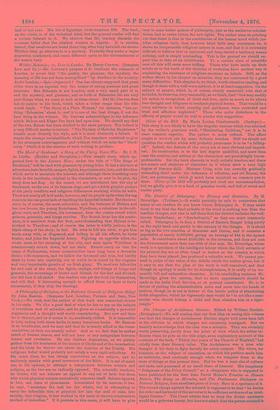A Philosophy of Religion, or the Rational Grounds of Religious
Belief. By John Bascom. (Sampson Low, London ; Putnam and Sons, New York.)—We wish that the author of this work was somewhat clearer in his style. We like a good deal of what he has to say on the subject of revelation and of miracles, and he gives us occasionally a powerful argument and a thought well worth remembering. But now and then he is obscure, and as it seems to us, needlessly stilted. It is impossible to help noting both these faults in many American books. Mr. Bascom is an intuitionist, and we may add that he is nearly allied to the trans- cendalista, as they are usually called. And so we find that he makes much of human reason, and will not hear of any antagonism between reason and revelation. He also dislikes dogmatism, . as we plainly gather from his treatment of the nature of Christ and of the incarnation, and the hints he throws out about the doctrine of the Trinity. His religious belief would probably not satisfy a very rigid orthodoxy. At the same time, he has strong convictions on the subject, and he uniformly speaks with great reverence of the Bible. It is not of much use, in his opinion, to attempt a compromise between science and religion, as the two are so radically opposed. The scientific teachers, he thinks, will not tolerate an appeal to any set of facts but those with which physical science exclusively concerns itself. Science ignores, in fact, one class of phenomena. Intoxicated by its success, it has, he says, "mistaken the half for the whole, but in attempting to carry the inflexible idea of physical law into the soul of man, into society, into religion, it has worked in the teeth of its own constructive method of induction." If it persists in this cause, it will have to give way to some better system of philosophy, just as the medieval scholaa. ticism had to retire before the new lights. The author aims at pointing out that there is that in the constitution of the human mind which jus- tifies religions faith, that however blind faith may sometimes be, it shows an irrepressible religions nature in man, and that it is extremely difficult to believe that so universal and deep-seated a tendency means nothing, and is simply misleading. This is the ground we should ex- pect him to take as an intuitionist. To a certain class of scientiflo men all this will seem mere trifling. Those who have made up their minds as to the truth of the doctrine of evolution have another way of explaining the existence of religions emotions as beliefs. Still, as the author shows in his chapter on miracles, they are confronted by a good many difficulties. This chapter is, we think, worth attentive reading, and though it deals with a well-worn subject, it is at least suggestive. On the subject of prayer, which is, of course, closely connected with that of miracles, he observes, very reasonably, as we think, that " God may modify his action in recognition of trust and love, quite as much as he allows fore-thought and diligence to readjust physical forces. That would be a sorry universe in which cunning and quickness were rewarded and trust and affection neglected." Those who quite disbelieve in the efficacy of prayer would do well to ponder this suggestion.


































 Previous page
Previous page